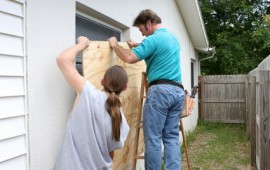What To Do BEFORE Disaster Strikes
Author: Shannon Miller Lifestyle

Disaster Preparation: Are you prepared for a disaster?
Depending on where you live, the disasters you may have to prepare for will look a little bit different. Hurricanes mainly hit the gulf region and the east coast, tornadoes are most common in the central states, earthquakes are common on the west coast, and wildfires or housefires can happen anywhere.
When disaster strikes, will you be ready? It may seem cliché, but all too often families and individuals are not ready. As hard as it can be to make yourself “prepare for the worst”, we may find out too late that we are not completely prepared.
How do I talk to my kids about disasters?
You don’t want to scare your children about disasters, but they should have an idea of how to be proactive in the case of an emergency. Every child should know how to use a phone in the house to dial 9-1-1, in case a parent is incapacitated and can not dial. They should also have a plan to evacuate if the house is in danger.
Prepare for Fires
Practice fire escape routes. Teach your kids to crawl through the hallways to reach a safe exit door, and how to escape out the window if necessary. Tell your children where to meet you if they are separated from you. A good place would be at a next door neighbor’s house, if you have a neighbor that you trust in these situations.
If a brush fire is threatening your neighborhood, follow the instructions of the neighborhood police or sheriff’s office. If they tell you to evacuate, pull together your family, and leave. Find a place to stay that is completely out of harm’s way.
Prepare for Tornadoes
If your town has a tornado warning or you hear a warning siren, get your family to an area away from windows. Practice sitting down and covering your head and neck with your hands, your forehead down on the floor. This is the safest position for you and your family. If you are outside, go to a shelter if you can, preferably one that is sturdy and free of glass. In a house, experts say a windowless bathroom is the safest place if you do not have a specific tornado shelter or a basement.
Prepare for Hurricanes
The gulf coast and east coast must be particularly aware at this time of year. Staying on top of hurricane tracking reports is a must, so an occasional check of weather.com can quickly keep you informed of any possible threats. If there is a threat coming to your area, pay attention to your specific region and the recommendations for that region. Chances are, if your neighborhood is below sea level, you will be asked to evacuate, even for a category 1 hurricane. In other neighborhoods, you may be asked to leave on a graduated schedule. Pay attention to television or radio alerts for evacuation instructions.
Before you leave your home in a weather emergency threat situation, if there is time:
- Fill up the car with gas, and keep it relatively full during hurricane season.
- Take your pets with you or leave them with someone you trust.
- Store any outside potted plants, furniture, and lightweight grills in a shed or garage, if possible.
- Board up your windows with plywood. Many areas have window security laws, which means that the company that installed your windows may have cut plywood for emergency cover. If you do not have newer windows with covers, you should have plywood cut to the size of your windows well in advance and stored where you can access them in case of an emergency.
- Take a video or pictures of every room in your house and the outside of your house. Take these pictures with you. This is for insurance purposes.
- Take your insurance cards and information with you.
- Pick up electrical items from the floor. Unplug everything that you can.
- Bring identifying information for you and the members of your family, such as driver’s licenses or passports. Bring phone numbers of people who may be asking about your safety.
- Bring bottled water.
If you are staying through a hurricane:
- Bring your pets inside.
- Secure potted plants, outdoor furniture, and small grills in your shed or garage.
- Board up your windows if there is time.
- Put your valuables and insurance information (with pictures or video as listed above) in a fire-proof safe.
- Have a bag packed and ready to get out if necessary.
- Have plenty of bottled water
- Have a battery powered or crank powered radio ready to use with extra batteries if necessary.
